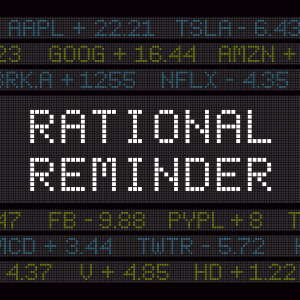
Uninsurable Condos, Floundering Robo Advisors, and Counterfactual Thinking (EP.86)
 2020-02-20
2020-02-20
Let's say you make a choice that had you chosen differently, things would ostensibly have turned out more favourably. Later on, a similar situation comes up and you make the choice you think you should have made previously in the hope that the result you wanted before will come true this time around. This is called counterfactual thinking and it forms the main topic of our discussion in today’s episode. First publicized in a fascinating paper called The Psychology of Preferences, Daniel Kahneman and Amos Tversky explore the abundance of instances where humans employ irrational ‘what if’ thinking in their processing of recently made decisions that resulted in an undesirable outcome. People tend to think back and wish that they had made a different choice, irrationally thinking that if they had, things would have worked out better. This idea, of course, has applications to investing in stocks with particular implications due to the utter randomness of the market. This is a mind-blowing discussion about human irrationality with links to many leading papers that research this principle in relation to different situations. Outside of our main discussion, we also touch on why you should think twice before buying a condo, the utter absurdity of the Robo-Advisor business model, monthly posted DVD accounts and the surprising birth of Netflix, and finally, the ambiguity of Vanguard’s partnering with HarbourVest.
Key Points From This Episode:
The story of Netflix’s origin starting by renting DVDs out by post. [0:02:30.0] Life expectancy, annuities, and Wade Pfau’s ideas on Safety-First retirement planning. [0:04:56] Investor/insurer reluctance and why you shouldn’t buy a condo. [0:07:23] The Robo-Advisor financing crisis and eventual merge of software and humans. [0:11:28] Counterfactual thinking and how it affects investment patterns. [0:17:40] The central role closeness of a related incident plays in ‘what if’ thinking. [0:21:21] Contrast effects: winning $50 feels good unless you could have won $100. [0:24:42] Causal inference effects: rectifying a past problem by acting its solution in the future. [0:27:37] Investor preferences reflecting counterfactual thinking and attachment to stocks. [0:31:27] The effect the end of WW1 had on people to blind them to the coming depression. [0:36:00] How there is no proof that if we acted differently a desired set of realities would result. [0:40:22] The randomness of the stock market and how mastering it is thus impossible. [0:41:34] Tools for beating counterfactual thinking: document your original rationale, etc. [0:43:19] Jason Zweig’s tips: lightning rarely strikes twice, and only gamble 10% of your money. [0:44:17] Bad or good advice? Vanguard’s partnering with HarbourVest. [0:47:32] How private equity valuations used to be low, resulting in high expected returns. [0:50:09] And much more!More Episodes
Create your
podcast in
minutes
- Full-featured podcast site
- Unlimited storage and bandwidth
- Comprehensive podcast stats
- Distribute to Apple Podcasts, Spotify, and more
- Make money with your podcast
It is Free
- Privacy Policy
- Cookie Policy
- Terms of Use
- Consent Preferences
- Copyright © 2015-2024 Podbean.com





